How to Write an Effective Literary Analysis Thesis Statement
Cailey Rogers is a class of 2024 Writing Center consultant. She is studying Journalism and English Literature. At Elon, she is a Communications Fellow and is involved in Elon Learning Assistance, Colonnades Literary and Art Journal, and the Pendulum.
I distinctly remember that when I was in middle school and just beginning to learn how to write essays, the most daunting task was crafting a thesis statement. Back then, my teachers would put so much emphasis on one part of the entire paper; now that I’m in college, I understand why.
Writing a thesis statement hasn’t become easier over time for me. In fact, now that I am writing complex papers for my 3000-level classes, it has proved to be even more challenging. But honestly, I have come to appreciate this part of a paper to the point where I cannot write the body paragraphs of my work until I am satisfied with the thesis statement.
As an English Literature major, I most look forward to writing thesis statements for literary analysis essays. But I realize that the idea of writing a long analysis on a piece of literature is not fun for everyone. Well, I’m going to offer some suggestions and advice to anyone tackling a literary analysis paper – whether this is your first time writing one, or you’ve been doing it for years, these thesis statement tips will give you a roadmap to creating a thesis that will not just start your paper off on the right note, but also display your writing skills and critical thinking. If you have a strong thesis, I guarantee that your paper will be more sophisticated and easier to write. While my focus here in on literary analysis, my tips apply to anyone writing an analysis and interpretation of a text.
Like any thesis statement, a literary analysis thesis should work as both a roadmap and a foundation for your essay. As the Writing Center at the University of North Carolina at Chapel Hill advises, the thesis statement should do more than illuminate how you are going to “interpret the significance of the subject matter under discussion;” it should also give the reader an outline of the paper itself. This means you need to state what topic you want to focus on, what specific details you will use as textual evidence, and why your argument is important. If you draw a clear map and build a sturdy foundation, the rest of your analysis can grow to be much stronger as a whole.
Let’s break down an example that may make this point a little easier to digest. Here is a practice thesis statement from the WAC Clearinghouse that distinguishes between a vague thesis and one that provides a detailed blueprint for the paper:
Original:
Revised:
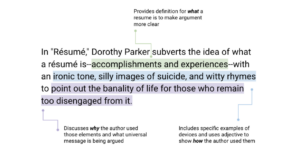
In the first example, the thesis only mentions that the author uses poetic devices, but the second one lists out each of the specific devices that the writer will focus on: tone, imagery, and rhyme. It would then be expected that the essay would follow a specific structure that expands on each of those devices following the same order. Also, the second one adds an extra bit of nuance at the very end to show what the author is using those elements for and what larger argument you will connect each piece of evidence to. The second thesis is not only more developed, but it also provides a clear outline for the paper itself.
Another valuable piece of advice is to make sure not to state the obvious in your thesis statements. In addition to thinking of your thesis statement as a map or a foundation, think of it also as a hook. You want your readers to be interested in what you have to say, so make your thesis statement compelling enough so that a reader simply can’t resist reading the rest of the paper.
Here is another example from the WAC Clearinghouse on how to accomplish this feat:
Original:
Revised:
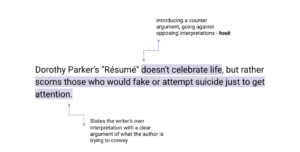 While the first statement seems quite straightforward and incontestable, the second one adds the writer’s interpretation of the text and implies that they are going to be arguing against an idea that this text “celebrates life.” I would expand this thesis even further by adding more specific examples and details of the analysis. This sentence clearly states an interesting argument, but there is certainly more the writer could expand on to enhance the quality of the thesis. Here is what I would add:
While the first statement seems quite straightforward and incontestable, the second one adds the writer’s interpretation of the text and implies that they are going to be arguing against an idea that this text “celebrates life.” I would expand this thesis even further by adding more specific examples and details of the analysis. This sentence clearly states an interesting argument, but there is certainly more the writer could expand on to enhance the quality of the thesis. Here is what I would add:
Expanded:
Note: To learn more about the “what,” “how,” and “why” aspects highlighted in these examples, check out the second blog post in this series, where I discuss my own personal process when writing a literary analysis thesis statement here!
Now, these may seem like pretty standard suggestions that would work for all kinds of thesis statements across a variety of fields. And they are. That doesn’t mean they aren’t important to keep in mind, though. But I did come prepared with some suggestions that are specific to writing a literary analysis essay that I have learned from Dr. Janet Myers, Professor of English in the English Department at Elon University. I’ve taken several classes with Dr. Myers, written countless literary analysis papers, and these four simple characteristics to include in a thesis statement have gotten me through each one. According to Dr. Myers, these are the four characteristics of a successful thesis statement:
By this, I mean that you want to assert a position that moves beyond something that is clearly obvious within the text. More specifically, you are going to want to isolate a subject you can explore with your own voice. You don’t want to merely point out that a theme of pattern exists in a text; you want to argue about its meaning or purpose. Think of everything you write as being a contribution to a big conversation of scholars. What do you want to contribute to this conversation? You don’t want it to be just an observation but rather an argument that you can support and defend.
2. Narrowly Focused
Even though you do want to address some universal and pervading aspects of the text you are analyzing, you definitely don’t want to overburden yourself. The broader your thesis is, the more you would be required to explain, and the harder it would be for your audience to understand the particulars of your argument. So, make your thesis statement limited in scope. Identify a specific pattern, theme, literary device, character, or historical event (and there are certainly more possibilities) from the text that you want to analyze in your paper. This is where you could build the roadmap aspect of the thesis: list the elements in the order you will write about them in, and suddenly you will have a clear path for entire literary analysis.
3. Clear and Concise
This may seem obvious, but it is crucial. A clear thesis will play into the idea of a roadmap, but it will also avoid using long, complex clauses or unnecessary jargon. In terms of making it concise, look for any words in your thesis that may not add to the overall point you are trying to make, and cut them out. Streamline your thesis statement by simplifying your ideas as much as you can, almost as if you were trying to explain it to someone who has never read the text before. Ultimately, your thesis should be able to stand completely on its own. If you just gave your professor your thesis statement and left out the rest of your paper, your topic, evidence, and argument should all be transparent and evident.
4. Capable of Transcending Specific Characters and Events in the Text
This one is particularly important to keep in mind for a literary analysis paper. What makes a strong literary analysis is an argument that isn’t limited to one specific plot point or character within the text. Think of it this way: pretend you are trying to convince a friend that they should take up reading as a hobby because it is entertaining and enriching. But the only evidence you have to back this up is that you really enjoyed reading one book in the past month. Obviously, that is never going to convince your friend to take up reading because that argument only pertains to one person’s experience at a singular point in time. You would want to have more examples of how reading has changed people’s lives across the world, not just you. Also, you would probably want to address some of the larger persuasive arguments like how literature increases the value of an education, or how it can teach you about a variety of different topics. You would do the same thing in a literary analysis paper: you would want to address the wider implications of the text and find patterns or themes that pertain to more than one specific event or character. Challenge yourself to find connections between events and characters, and then trace those connections in your writing. But even more than that, try to find a universally significant message that your text represents. Literature is a reflection of reality, so find out what your text is trying to express about the real world, and then write about it.
I know it can seem intimidating to write a literary analysis paper, but if you follow these tips when writing your thesis, the challenge will suddenly seem much less impossible. If you want to continue learning about writing a successful literary analysis thesis statement, you can find another blog post I wrote about my personal process and tips by clicking on this link. And if you still find yourself doubting your work, you can always come to The Writing Center, and we would be happy to help you!
One response to “How to Write an Effective Literary Analysis Thesis Statement”
Leave a Reply
You must be logged in to post a comment.

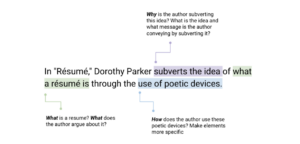
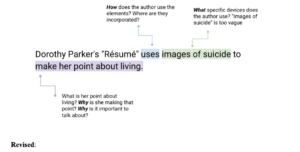
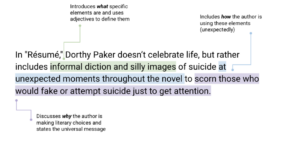
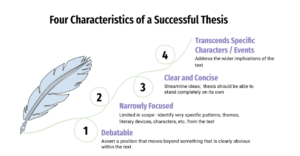
[…] In my short time at Elon, I have found that the most challenging and rewarding part of writing a long literary analysis paper is the thesis statement. It’s funny how just one small portion of what can become an eight-page essay seems impossible to accomplish. If you feel that way, you are certainly not alone. Even English majors struggle with it – I can say that from personal experience! That is exactly why I decided to share the tips and processes that have helped me the most when writing a literary analysis thesis statement in hopes that it could help others staring at a blank document, not knowing where to start or feeling like they will never be able to write a good paper about a piece of literature. If you want to know some of the general tips and tricks that I have acquired through my English classes and some other resources, you can read my first blog post here. […]